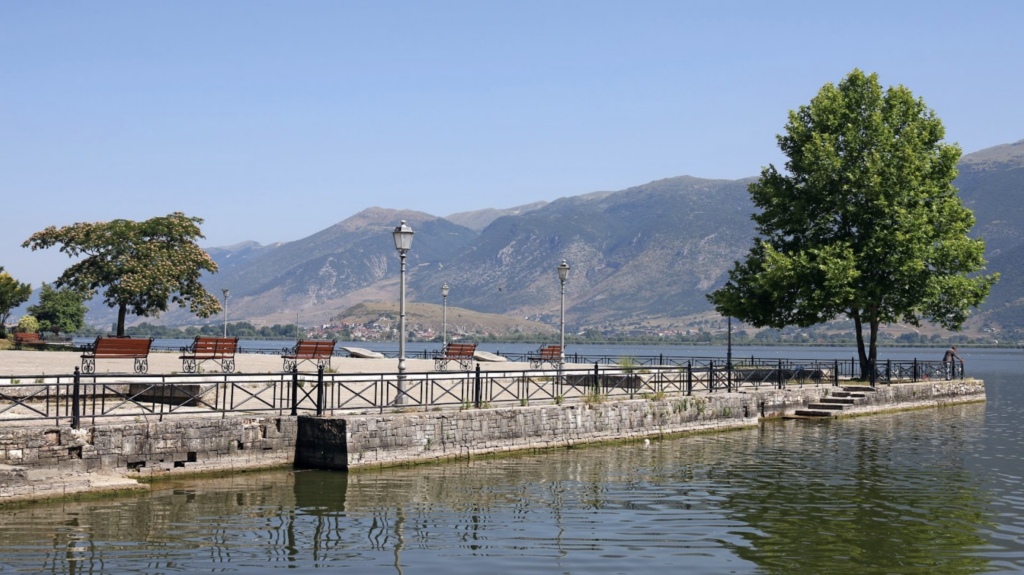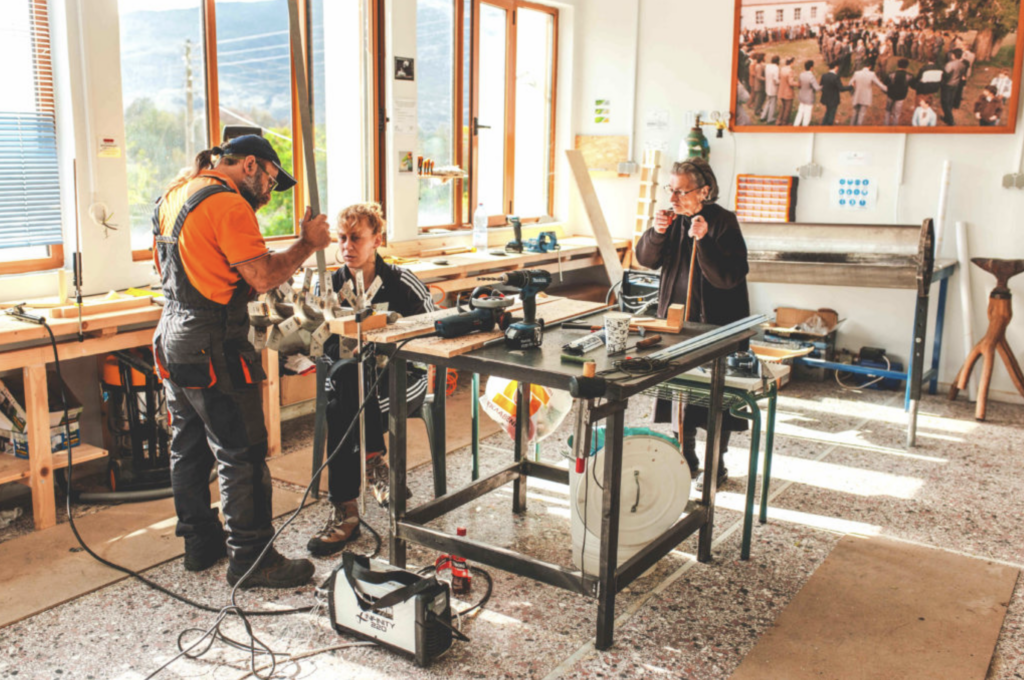By Katerina-Shelagh Boucoyannis, University of Padova, MSc Climate Change and Diversity: Sustainable Territorial Development
The Fortune of Epirus
“Fortunate are the mountains, fortunate are the plains,” sings a polyphonic song from Epirus, contrasting the timeless vitality of nature with the fleeting existence of humans. Viewed through the lens of Western modernity, Epirus may appear as an isolated, mountainous region—home to just 3.1% of Greece’s population and the poorest in terms of Gross Domestic Product (GDP). Yet, its cultural and ecological significance is unparalleled.
The lyrics of the song hint at a twofold relationship: the pristine natural environment and the deep bond humans have with it. Home to some of Greece’s few “roadless areas,” protected by a progressive -yet still unimplemented- law that could serve as a pilot for the EU’s biodiversity strategy (Kati et al., 2023), Epirus is renowned for its high ecological integrity, minimal human impact, and extensive natural vegetation. It is no coincidence that Epirus hosts sacred forests in many of its villages—forests that embody the profound relationship between communities and their natural surroundings. These sacred forests, among the world’s oldest conservation systems, are based on principles of the commons and reflect age-old practices of communal stewardship (Stara et al., 2016).
Mounting Threats
Epirus faces two significant threats: rural depopulation and the emerging risks associated with the energy transition. As residents leave, the social and economic fabric of these remote areas weakens, leading to a devaluation of land that paves the way for the extraction of fossil fuels and disruptive renewable energy projects. Unlike what the climate emergency would call for, these projects do not stem from a just, planned, and inclusive energy transition. Instead, they reflect a lack of coherent planning, an extractivist logic, and a subsidy-driven approach that primarily benefits large capital interests while sidelining local communities. This situation is intensified by EU legislation that allows Southern European countries to supply energy to Northern Europe vis-a-vis their climate commitments. As a result, Greece’s mountains and seas are being transformed into a renewable energy farm for the continent, en tero ushering in a new era of energy colonialism (Argenti and Knight, 2015; Knight, 2014). Such dynamics highlight the urgent need for a more equitable and sustainable approach to energy production and sustainable rural development overall that prioritises local needs and the region’s natural and cultural integrity.
This situation is intensified by EU legislation that allows Southern European countries to supply energy to Northern Europe. As a result, Greece’s mountains and seas are being transformed into a renewable energy farm for the continent, ushering in a new era of energy colonialism.
A Call for Alternatives
There is a flourishing movement in the region emerging around the extractivist models and the narrative of depopulation and abandonment. Apart from its consistent bottom-up resistance to renewables, Save Epirus, initially created by a group of residents of Epirus to protect the environment, water resources, and their quality of life from hydrocarbon exploration in seven municipalities, has broadened its focus to address other environmental concerns. One of the issues the group focuses on regards the unchecked pace of wind farm installations. The group gradually broadened its action to address an equally serious issue arising: the unchecked pace of wind farm installations.
Parallel to the environmental movement, an Epirote socio-ecosystem of post-growth alternatives has emerged that includes a world-renowned research hub on the commons, a beehive of social and solidarity economy enterprises that consist of decentralised maker spaces, community-supported mountain agriculture, mountain revitalisation projects, and energy cooperatives. Together, these post-growth initiatives form a flourishing and diverse network that promotes a just, community-led socio-ecological transition with a bioregional focus.

Ioannina Lake and Mountain Epirus Greece
A Short Breakdown of the Socio-Ecosystems’ Members
P2P Lab designs and implements projects using participatory and community-based methods and practices, forwarding research and knowledge through the creation of spaces for creative resistance and commons-based alternatives.
P2P Lab founded Tzoumakers community makerspace, an open lab for communities to cooperatively design and manufacture tools for small-scale agricultural production. Tzoumakers is part of a flourishing ground for maker spaces in the region: Habibi. Works, an intercultural maker space that empowers refugees, promotes education, and links with the local population,n has also been operating in the area since 2016.
In close geographical and ideological proximity to the above, The High Mountains Coop, a social cooperative aiming at reviving mountainous communities and repopulating the isolated villages of Epirus was established. The High Mountains has recently launched the first pilot of Community Supported Mountainous Agriculture in Greece, linking producers with the nearest urban centre, Loannina. They recently set off to restore the old school of Demati, where they are based and build the first Mountain Support Center in Greece. In 2024, Nea Guinea Coop joined the local socio-ecosystem, bringing its extensive experience in regenerative land practices based on permaculture principles and renewable energy systems at the farm level. The Coop focuses on producing decentralised and autonomous energy systems, for but not limited to, mountainous areas. All of the above have contributed to the establishment of Epirus’ first Association of Social and Solidarity Economy (SSE) initiatives, which was formed in early 2022 (Liodaki, 2024). This Association acts as a sounding ground for new initiatives as well: in 2024, another SSE initiative aired in the neighbouring mountainous village of Kalochori. Ecotopia, a SSEOE founded in 2024 is the latest example of a group of locals who, aiming to revive the village based on the principles of solidarity economy, started a campaign to raise funds, aiming to, among others, to provide housing solutions, activate the local Kafenio, boost local food production and eventually provide the necessary infrastructure for new residents to re-inhabit the area.
Last but definitely not least, P2P lab, The High Mountains, along with Electra Energy Cooperative, have recently founded the Epirus Living Lab, an ecosystem of inclusive research and open innovation, which aims to create tools for social and environmental sustainability at both productive and organisational levels, in the region and beyond.
These initiatives represent just a few examples of the vibrant and expanding network of community-led, post-growth alternatives in Epirus. Across the region, different grassroots projects and cooperatives are emerging, each contributing to a broader ecosystem of social, ecological, and economic transformation. Whether through regenerative farming practices, cooperative energy solutions, or new models of democratic governance, these initiatives highlight the importance of locally-rooted solutions, illustrating how small-scale, community-driven efforts can inspire and influence larger systemic change.

Inside the Tzoumakers maker space. Photo by Nicolas Garnier. Retrieved from https://www.tzoumakers.gr
A Call for Scale-Wide Sociological Transition
This socio-ecosystem of community-led, post-growth alternatives in a marginalised mountainous area addresses core principles of climate justice while highlighting the transformative potential of its prefigurative politics. It construct[s] new community subjectivities, relations, and infrastructures that make a more just and sustainable future tangible and actionable in the present (Kostakis, 2024). If anything, this is the greatest success of this socio-ecosystem: shifting the imaginary that perceives a mountainous area as poor and isolated towards an inspiration of other regions to scale their socio-ecological transition. As Arturo Escobar asserts:
If the world is a web of radical interdependence, it follows that all local, place-based, and communal struggles are already interconnected, even if they might not know it. There is no “scaling up” to be achieved because there is no “up” to be found. We need to imagine a different politics consistent with this deeply relational vantage point. Such politics might enable us to expand the field of what we consider possible. (Escobar, 2019)
*Support the first Greek Mountain Support Center, a hub to breathe new life into mountain villages like Demati: Fundraiser here
References
Argenti, N., Knight, D.M., 2015. Sun, wind, and the rebirth of extractive economies: renewable energy investment and metanarratives of crisis in Greece. J. R. Anthropol. Inst. 21, 781–802. https://doi.org/10.1111/1467-9655.12287
Escobar, A., 2019. The Global Doesn’t Exist | Arturo Escobar [WWW Document]. Gt. Transit. Initiat. URL https://greattransition.org/gti-forum/global-local-escobar (accessed 2.26.23).
Kati, V., Kassara, C., Panagos, P., Tampouratzi, L., Gotsis, D., Tzortzakaki, O., Petridou, M., Psaralexi, M., Sidiropoulos, L., Vasilakis, D., Zakkak, S., Galani, A., Mpoukas, N., 2023. The overlooked threat of land take from wind energy infrastructures: Quantification, drivers and policy gaps. J. Environ. Manage. 348, 119340. https://doi.org/10.1016/j.jenvman.2023.119340
Knight, D.M., 2014. A critical perspective on economy, modernity and temporality in contemporary Greece through the prism of energy practice. LSE Res. Online Doc. Econ.
Kostakis, V., 2024. Envisioning energy futures through visual images: What would a commons-based energy system look like? Soc. Sci.
Liodaki, D., 2024. Alternative futures “in the making”: Insights from three makerspaces in peripheral Greece. Futures 164, 103481. https://doi.org/10.1016/j.futures.2024.103481


